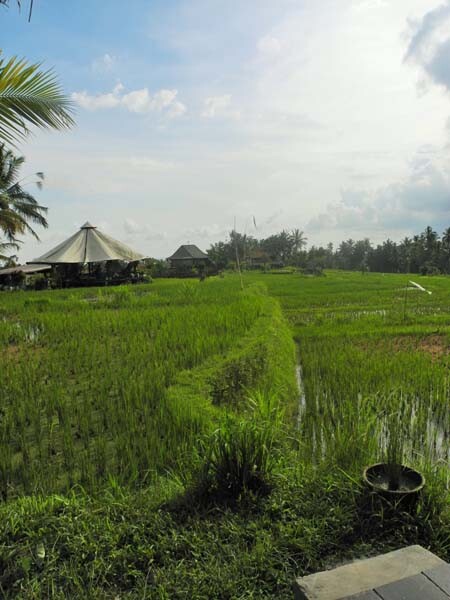
by Gabriela Aleman
“So you’re basically living in paradise for half of your gap year?” said most of my friends and family when I told them the second part of my year would be spent teaching English in Bali, Indonesia. Most of what I’d learned about Bali, whether from people or research, really did make it seem like I’d be spending a good chunk of time living in a vacation world.
I spent my first month in Ubud, deemed the “cultural hub” of Bali. And Ubud was exactly everything everyone said it would be: little markets bursting with artistic crafts, restaurants piled atop one another, yoga and spirituality out the wazoo, beautiful, scenic rice fields, and an eclectic blend of tourists from all around the world. Within the first week, I was able to meet and connect with a group of volunteers finishing their work before the end of the year. During that time we bonded over delicious Balinese food, attended the cremation ceremony of a relative of a king, went out dancing to bars, got our bags almost stolen by monkeys, mingled with foreigners and Balinese alike, and overall had a great time. However, after that first week, all the volunteers left except for my roommate, leaving me basically alone for my three week break while all the Balinese children didn’t have school.
I don’t have a problem with being alone; I actually indulge in having time for myself, so I welcomed the new absence of people. I was ready to explore Ubud in my own way, without the influence of people who had been there for months. What I found out shocked me: I honestly did not enjoy being in Ubud—at all. I grew frustrated with the atmosphere the town embodies; it felt to me like I was living in a fabricated world. Tourism has completely overrun it with Western influence. Small, local restaurants are overshadowed by over-priced and posh Western ones; yoga has lost its spiritual side and has simply become a way to make money off of foreigners; expats come to set up small businesses, overtaking local ones in the process, and then settle. Even though the Balinese do an impressive job of preserving their rituals and culture, everything is driven by the Western world and money the tourism industry brings in.
I quickly discovered this was a situation I had not expected and did not welcome. I spent my birthday, Christmas, and New Years there—and while back in the US I thought there would be no better place to be spending my holiday season, it ended up being quite uneventful for me. Because the Balinese are Hindu and don’t celebrate Christmas, December 25th felt like any other day and I was surprised by how much being away from my family affected me. New Years was spent in a similar fashion—I welcomed 2015 alone and barely made it forty-five minutes into the new year before falling asleep.
I felt stuck, and to be completely honest, pretty bitter. I got to the point where I just couldn’t wait to leave for my actual volunteer work, which would be taking place up north in a much more rural part of Bali in the region of Karangasem. Don’t get me wrong, I still liked Ubud—it’s a unique place that I think merits a visit from everyone. In fact, two of my favorite things about the town include the wonderful rice fields that surround it and the amount of detail and precision the Balinese invest in their architecture and any other type of art. But I also realized that being a student on a budget is not a desirable way to spend a month in Ubud.
I’m sure that if I would have visited Ubud for a week, maybe surrounded by friends or family, I would have had a completely different experience. On the flip side, I’m glad I was able to realize what I did about it—I think it’s taught me about environments I find myself comfortable in. Regardless, I’m grateful to be in such a wonderful country surrounded by an interesting culture and genuine people. Here’s to a fabulous new year—let’s see what 2015 has to offer!



